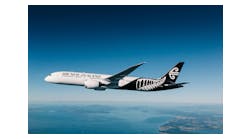Airlines for America (A4A), a trade organization for the U.S. airlines, reported that U.S. airlines delivered one of their best years ever for operational performance, built on their stellar safety record, and achieved a narrow profit as expenses grew faster than revenues for the second consecutive year.
According to the Department of Transportation's Air Travel Consumer Report, the nation's carriers achieved the best year for on-time arrivals since 2003, a record-high success rate of 99.7 percent for baggage handling, the lowest cancellation rate since 2002 and reduced tarmac delays. The 10 U.S. airlines reporting full-year 2012 results to date earned a combined $152 million or 21 cents of net profit for every passenger enplaned.
According to a release, earnings fell as expenses rose 4.7 percent, outpacing 4.5 percent higher revenues. Maintenance material led the increase in costs, followed by fuel, labor and other items. The price of jet fuel reached a record-setting, year-long average of $128 per barrel, costing these carriers approximately $50 billion for the second consecutive year.
"U.S. airlines eked out another year of meager profitability as expenses grew faster than revenues with record-setting fuel prices serving as a primary driver," said A4A Vice President and Chief Economist John Heimlich. "The airlines spent some $50 billion to fuel their flights despite using half a billion fewer gallons in 2012 than in 2011 and last week the price of jet fuel hit its highest level in nearly a year. Fuel remains the airlines' single largest expense."
2012 Financial Summary
-Net profit: The $152 million profit reflects the results of 10 U.S. passenger airlines Alaska, Allegiant, American, Delta, Hawaiian, JetBlue, Southwest, Spirit, United and US Airways and translates to 0.1 percent of revenues. These results represent a decline of 64 percent from 2011, in which these same 10 carriers reported net income of $418 million or 0.3 percent of revenues.
-Revenue and Expenses: Revenues increased 4.5 percent but were outpaced by expenses that rose 4.7 percent. Fuel costs rose 5.9 percent and fuel remained the industry's largest cost at $50 billion or approximately 36 percent of total operating expenses, an all-time annual high.
"U.S. airlines delivered some of their best operational performance for on-time arrivals and baggage delivery in history, while continuing their stellar record of safety and investing in ongoing improvement to the travel experience for customers," said Dan Elwell, A4A's Senior Vice President of Safety, Security and Operations. "This is a tremendous credit to the airlines and their employees who are committed to providing a safe, efficient and comfortable experience for air travelers."
2012 Operational Summary
-Customer Service: According to the Department of Transportation, the airlines had the best year ever for baggage performance with 99.7 of every 1,000 passengers having their bags properly handled. Also, 81.85 percent of U.S. airline flights arrived on time, the third best year on record and the highest since 2003. The flight cancellation rate of 1.29 percent was the lowest since 2002, aided in part by better-than-expected weather. Tarmac delays were also down year over year.
The airlines achieved all of this despite weathering some of the highest jet fuel prices and steepest federal tax burdens in history and could be much more globally competitive with a National Airline Policy in place. A4A has proposed a policy that includes the following key points:
-Taxes and fees on airfares.
-Reforms antiquated regulations that add unnecessary costs and do not benefit customers or safety.
-Modernizes the nation's Air Traffic Control System to affect delays and emissions.
-Stabilizes energy prices through a balanced and national energy policy.
More information:
((Comments on this story may be sent to [email protected]))
Copyright 2013 Close-Up Media, Inc.All Rights Reserved






